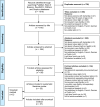Dementia Enlightened?! A Systematic Literature Review of the Influence of Indoor Environmental Light on the Health of Older Persons with Dementia in Long-Term Care Facilities
- PMID: 34079240
- PMCID: PMC8163627
- DOI: 10.2147/CIA.S297865
Dementia Enlightened?! A Systematic Literature Review of the Influence of Indoor Environmental Light on the Health of Older Persons with Dementia in Long-Term Care Facilities
Abstract
Light therapy for older persons with dementia is often administered with light boxes, even though indoor ambient light may more comfortably support the diverse lighting needs of this population. Our objective is to investigate the influence of indoor daylight and lighting on the health of older adults with dementia living in long-term care facilities. A systematic literature search was performed within PubMed, CINAHL, PsycINFO, Web of Science and Scopus databases. The included articles (n=37) were published from 1991 to 2020. These articles researched the influence of existing and changed indoor light conditions on health and resulted in seven categories of health outcomes. Although no conclusive evidence was found to support the ability of indoor light to decrease challenging behaviors or improve circadian rhythms, findings of two studies indicate that exposure to (very) cool light of moderate intensity diminished agitation. Promising effects of indoor light were to reduce depressive symptoms and facilitate spatial orientation. Furthermore, there were indications that indoor light improved one's quality of life. Despite interventions with dynamic lighting having yielded little evidence of its efficacy, its potential has been insufficiently researched among this study population. This review provides a clear and comprehensive description of the impact of diverse indoor light conditions on the health of older adults with dementia living in long-term care facilities. Variation was seen in terms of research methods, (the description of) light conditions, and participants' characteristics (types and severity of dementia), thus confounding the reliability of the findings. The authors recommend further research to corroborate the beneficial effects of indoor light on depression and to clarify its role in supporting everyday activities of this population. An implication for practice in long-term care facilities is raising the awareness of the increased lighting needs of aged residents.
Keywords: Alzheimer’s disease; assisted living; indoor daylight; light therapy; lighting; nursing homes.
© 2021 Goudriaan et al.
Conflict of interest statement
The authors report no conflicts of interest in this work.
Figures

Similar articles
-
Evaluating the Impact of a Daylight-Simulating Luminaire on Mood, Agitation, Rest-Activity Patterns, and Social Well-Being Parameters in a Care Home for People With Dementia: Cohort Study.JMIR Mhealth Uhealth. 2024 Nov 29;12:e56951. doi: 10.2196/56951. JMIR Mhealth Uhealth. 2024. PMID: 39611803 Free PMC article.
-
Tailored lighting intervention improves measures of sleep, depression, and agitation in persons with Alzheimer's disease and related dementia living in long-term care facilities.Clin Interv Aging. 2014 Sep 12;9:1527-37. doi: 10.2147/CIA.S68557. eCollection 2014. Clin Interv Aging. 2014. PMID: 25246779 Free PMC article.
-
Pilot study to examine the effects of indoor daylight exposure on depression and other neuropsychiatric symptoms in people living with dementia in long-term care communities.Clin Interv Aging. 2018 May 30;13:1071-1077. doi: 10.2147/CIA.S165224. eCollection 2018. Clin Interv Aging. 2018. PMID: 29881263 Free PMC article.
-
Effects of non-facilitated meaningful activities for people with dementia in long-term care facilities: A systematic review.Geriatr Nurs. 2020 Nov-Dec;41(6):863-871. doi: 10.1016/j.gerinurse.2020.06.001. Epub 2020 Jun 20. Geriatr Nurs. 2020. PMID: 32571584 Free PMC article.
-
[COVID-19 outbreak in nursing homes: what can be learned from the literature about other disasters or crisis situations?].Tijdschr Gerontol Geriatr. 2020 Apr 23;51(3). doi: 10.36613/tgg.1875-6832/2020.03.01. Tijdschr Gerontol Geriatr. 2020. PMID: 32951401 Review. Dutch.
Cited by
-
Effectiveness of Nature-Based Interventions in Reducing Agitation Among Older Adults with Dementia: A Systematic Review and Meta-Analysis.Healthcare (Basel). 2025 Jul 17;13(14):1727. doi: 10.3390/healthcare13141727. Healthcare (Basel). 2025. PMID: 40724752 Free PMC article. Review.
-
Effect of Ambient Bright Light on Behavioral and Psychological Symptoms in People With Dementia: A Systematic Review.Innov Aging. 2022 Mar 24;6(3):igac018. doi: 10.1093/geroni/igac018. eCollection 2022. Innov Aging. 2022. PMID: 35602310 Free PMC article. Review.
-
Evaluating the Impact of a Daylight-Simulating Luminaire on Mood, Agitation, Rest-Activity Patterns, and Social Well-Being Parameters in a Care Home for People With Dementia: Cohort Study.JMIR Mhealth Uhealth. 2024 Nov 29;12:e56951. doi: 10.2196/56951. JMIR Mhealth Uhealth. 2024. PMID: 39611803 Free PMC article.
-
Feasibility of Deploying Home-Based Digital Technology, Environmental Sensors, and Web-Based Surveys for Assessing Behavioral Symptoms and Identifying Their Precipitants in Older Adults: Longitudinal, Observational Study.JMIR Form Res. 2024 May 8;8:e53192. doi: 10.2196/53192. JMIR Form Res. 2024. PMID: 38717798 Free PMC article.
-
Investigating the effects of indoor lighting on measures of brain health in older adults: protocol for a cross-over randomized controlled trial.BMC Geriatr. 2024 Oct 11;24(1):816. doi: 10.1186/s12877-023-04594-7. BMC Geriatr. 2024. PMID: 39394603 Free PMC article.
References
-
- World Health Organization. The Global Dementia Observatory Reference Guide. Geneva, Switzerland: World Health Organization; 2018.
-
- Sloane PD, Mitchell CM, Weisman G, et al. The Therapeutic Environment Screening Survey for Nursing Homes (TESS-NH): an observational instrument for assessing the physical environment of institutional settings for persons with dementia. J Gerontol B Psychol Sci Soc Sci. 2002;57(2):S69–S78. doi:10.1093/geronb/57.2.S69 - DOI - PubMed
-
- Van Hoof J, Kort HSM. Supportive living environments: a first concept of a dwelling designed for older adults with dementia. Dementia. 2009;8(2):293–316. doi:10.1177/1471301209103276 - DOI
Publication types
MeSH terms
LinkOut - more resources
Full Text Sources
Medical

